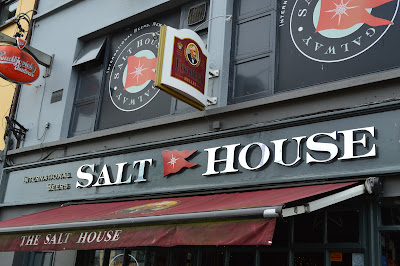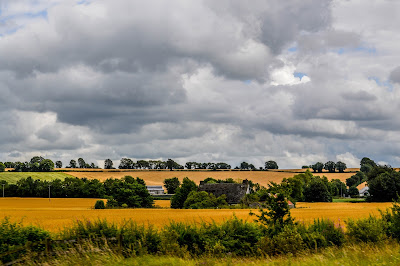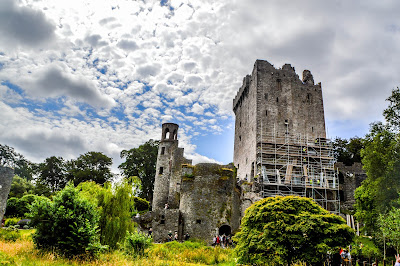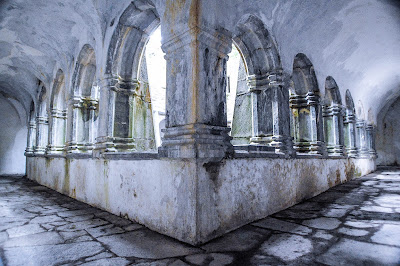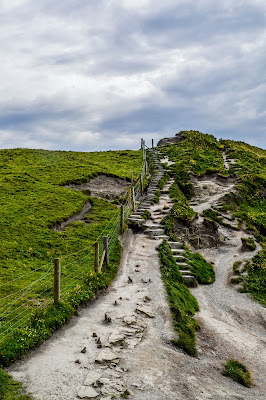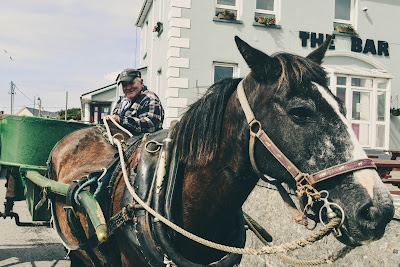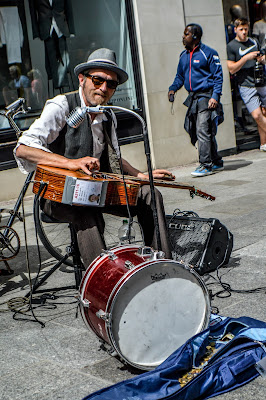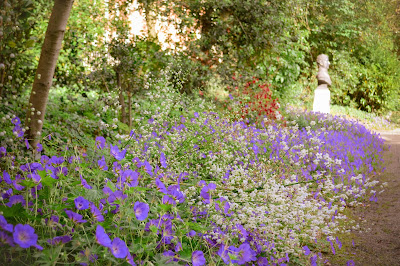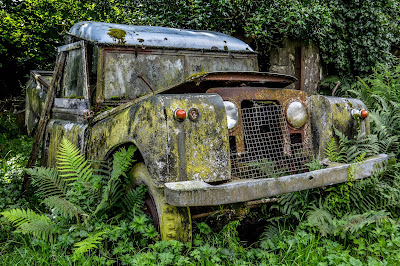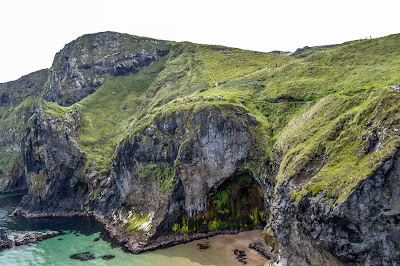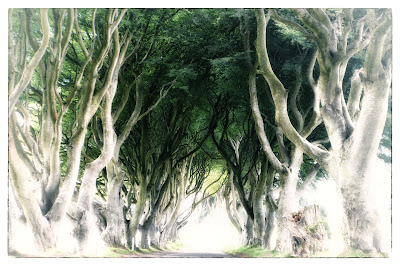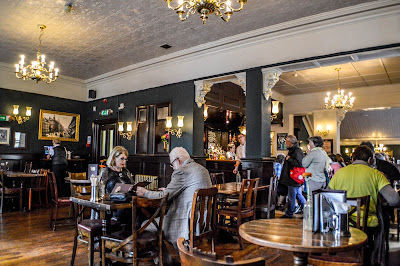Music, Whisky, and Beer, Oh My
Photography by Caroline Bergeron
Driving in Ireland is not for the faint of heart, but it
does bring its own special rewards. Manipulating a stick shift with your left
hand as you enter a roundabout on the opposite side of the road is actually the
easy part. The harrowing portion comes as you hurtle down Ireland’s L roads,
hemmed in by hedges on both sides and then encounter a cyclist at the same
moment as a tour bus travelling toward you rounds the hairpin corner laughably
rated at 100km/hour. Did we mention that Ireland’s L roads are only wide enough
for a single vehicle? Thank goodness for the Guinness at day’s end.
Best of Ireland @ a Glance
Best Pub – The Salt House,
Galway
Best Trad Music – O’Gorman’s,
Kilkenny & The Crane Bar, Galway
Best Restaurant – Fishy Fishy,
Kinsale
Best Tour – Jameson’s Distillery,
Midelton & Kilmainham Gaol, Dublin
Best Experience – Horse and
Cart Tour of Dun Aengus and Inis Mor, Aran Islands
Best Scenic Drive – Slea Head
Loop, Dingle & The Burren, County Clare
Best Beer -- Galway Bay Foam and
the Fury IPA (Brent), Franciscan Well Rebel Ale (Caroline)
Best Whisky -- 12-year-old Red Breast
Best Fish & Chips – McDonagh’s, Galway
Best Value – Killarney National
Park (Muckross Abbey and the grounds at Muckross House, Free), & Siuloid Cholmain Hike, Ventry (Free)
Best Accommodations – House
of Swans, Galway
Best Shopping – Quay Street,
Galway
Day One – Dublin to Kilkenny
The road to Kilkenny is mostly spent on the dual carriageway
M1 highway. This makes for an easy induction into Irish driving; however, as
with all highways, the views are probably not as spectacular. We rented our
trusty Toyota Yaris from Sixt. It was a painless process at the airport and a
quick getaway from the city.
Our accommodations for the entire trip were booked in
advance through AirBNB. It was our first experience with this service, and
overall, one to recommend. For those unfamiliar with AirBNB, it is a
facilitator similar to UBER, connecting travellers with room renters, instead
of rides – not unlike staying at a Bed and Breakfast.
Our trip began with Helen at Newpark Villa. She owns a
lovely, spacious home only a ten-minute walk from the city centre. Helen was a
wealth of information, and offered us free wi-fi and a scrumptious breakfast
the next day.
Kilkenny is a charming little town spanning the River Nore.
It’s serpentine streets and colourful shops are watched over by its commanding
medieval castle. Be sure to visit St.
Canice’s Cathedral, with its round tower built in the 12th century. The
Black Abbey is also beautiful. But if you are anything like us, you might have
come to Ireland for the beer. Hence no visit to Kilkenny is complete without a
visit to the Smithwicks Experience. Beer has been produced in Kilkenny since
medieval times. First by the Franciscan monks and later by John Smithwick. The
brewery tour last 45minutes and is interactive. But nothing beats the taste
testing at the end. Splurge and order the three-glass paddle.
Afterward, we had a nice meal of Atlantic Cod 3 Ways at the
family-operated Lanigan’s Bar and Hostel. There we also caught our first
hurling match on the giant screen.
Hurling is huge in Kilkenny. Kids and adolescents can be seen strolling
the streets and parks with hurlies in hand.
The highlight of our day, however, was a stop at O’Gorman’sPub (Kilkenny House) at the top of John Street, where local musicians gather
informally around a table in the front window to play traditional Irish music.
The evening we were there, two visiting fiddlers from Sweden joined in the mix.
Paddy, the barman, made us feel right at home with the local
crowd. He even invited Caroline to join him behind the bar for a better vantage
point for photography. He also has a great selection of Irish whisky.
Day Two – Kilkenny to Cork
The trip to Cork is another smooth one, and perhaps your
last! You get a small sampling of what’s in store as you exit the M8 for
Blarney Castle. Blarney Castle is
overrun with tourists, but still a must. Its gardens alone are worth the stop.
Purchase your tickets quickly and lineup for the slow and narrow ascent to the
Blarney Stone. The process may appear daunting from a distance; however, it is an
easy and safe experience. Well worth the time and effort in return for the gift
of the gab. Leave yourself three hours here, and be sure to hit the Witch’s
Wishing Steps and waterfall.
Our two nights in Cork were spent with Catriona – a
vivacious, knowledgeable, and easy-going hostess. Her eclectic little home is
just down the street from the Munster Rugby grounds, and about a thirty-minute
walk from the city centre. She gave us free run of the kitchen – not to mention
a refrigerator shelf full of breakfast goodies. She even gave us a ride
downtown on the first day.
Cork is lively with a big-city vibe, sandwiched onto an
island in the River Lee. We took a stroll down Oliver Plunkett Street in
between the South Mall and St. Patrick Street. The little alleys leading north
and south offered a wealth of shops and snug pubs. The beer to order here is
Beamish or something from the Franciscan Well – both local brews.
Although they serve all-day breakfast, we stopped for supper
the Thomond Pub on Marlborough Street. After a serving of onion rings to wet
our appetites, we both thoroughly enjoyed a plate of Cork Bangers and Mash.
What a feast. We stayed on awhile to hear the band and then took a quick taxi
back to Catriona’s – about 8 euros.
Day Three: Cobh, Midleton, and Kinsale
We should point out that the weather during our trip to
Ireland was uncharacteristically sunny and warm throughout. This undoubtedly
played into our enjoyment of Cobh – a seaside resort town on the hills of Cork
Bay. There we savoured a Beamish at the Trade Winds overlooking the harbour and
across from the Titanic Experience. Cobh was the last stop of the White Star Line
Ship before it sailed to its doom. The museum was a very original and personal
glimpse into the lives of the Titanic passengers and crew. If you plan on purchasing anything from the boutique next door, Lizzy C, save your ticket for a discount.
Our next stop was Middleton and the Jameson Distillery. We
would return to the distillery just to see the architecture and skip the
whisky… well, maybe not. This tour was arguably one of the best we took while
in Ireland. Our guide was keen and well-versed in the production of spirits. A
knowledgeable crowd threw very specific questions her way, but nothing could stump
her. If you are a whisky lover, volunteer to be one of their tasters. This way,
you will have a few extra tipples for your buck. Don’t worry, it’s not a test
you can fail. Caroline, who would not have considered herself a whisky
connoisseur, was introduced to the dangerously delicious Jameson, ginger-ale
and lime.
Thus, began the wild and woolly drive to Kinsale—our first
true introduction to the possibilities of Irish driving. If you choose to brave
the roads, you must then treat yourselves to supper at Fishy Fishy, repeatedly
voted the best seafood in Ireland. Caroline had the fresh hake, which simply
melted in her mouth. I had the unrivalled Fishy Fish Pie. Given our druthers we
would have stayed the night in Kinsale, if only to squeeze out a few more hours
in the picturesque harbour. It had a wonderful mix of restaurants, lively night
spots, and solemn medieval remnants. As it was, we returned to Cork the way we
came – harrowing roads and all.
Day Four: Cork to Killarney and the Ring of Kerry
We checked in with David after a short and easy drive early
on Sunday morning. David’s place was quiet and clean and literally around the
corner from the bustling city centre. However, we had little time to spare that
first morning, as it was our plan to drive the Ring of Kerry. The first highlight
on the Ring is Killarney National Park. We stopped at both Muckross Abbey and
Muckross House, two magnificent and picturesque sights. The former is a ruin
set among trees and fields and tombs; the latter is a superb mansion nestled in
the hills and overlooking Muckross Lake. Both are a photographer’s feast.
Beautiful views abound in the park, including those from Moll’s Gap as you
drive warily over the hills and down into Kenmare.
Do stop here for a light lunch and beer. O’Donnabhain’s Bar
and Guesthouse was our choice with its whisky barrel patio set out among the
passing pedestrians on a lively street. The chowder is especially tasty.
The Ring of Kerry is one of those occasions where having
your own car is a bonus. It is also a good training ground for the wilder west
coast stretches ahead. We stopped at will among the rolling stereotypical Irish
landscape, with its tiny parcels of green pasture, framed with stone hedges and
dotted with white sheep. For long expanses, the Ring skirts the coast with only
a stone wall between you and the sea. The camera lover in your party will enjoy
the pull offs that offer unparalleled views. There are also many neo-lithic
ruins along the Ring, like Staigue Stone Fort, which are inaccessible by tour
bus.
However, the gem of the Ring requires a detour onto the
lesser frequented Skellig Ring, which is also not accessible by bus. Just
outside Portmagee we visited the Kerry Cliffs, which are a dynamic rival of the
more famous Cliffs of Moher. There are few tourists here, but the vista of
cliffs and ocean is awe-inspiring. We hurried back along the northwest side of
the Ring, and were home in Killarney by 7pm.
Killarney is a bit Disneyesque when compared to other Irish
towns, but it does not lack for activity and pubs. We settled in to a pub on
Plunkett Street for a bite, and then moved on for a whisky and live music at
the cramped and raucous Dunloe Lodge. It pays to be within walking distance of
your accommodations.
Day Five: Dingle Peninsula
The Lir Café around the corner from our AirBNB opened early,
and after a quick pastry and a coffee we were off to the Dingle Peninsula. In
our estimation, driving the Dingle is an even more rewarding experience than
the Ring of Kerry – and that’s saying something.
As we shuttled out along the
south shore of the peninsula, we were treated to magnificent views of
Castlemaine Harbour, Inch Beach, and the Kerry coast we had driven the day
before. There are frequent pull-offs for picture taking, so don’t slow the
traffic behind you.
Dingle Town is all bustle in the
summer. At once quaint and touristy, it
offers centuries old buildings with colourful facades. It was at the tourist
info centre here down by the harbour that we grabbed a perfect map to help us
plan our day’s drive and stops. To begin, we can’t stress enough how important
it is to drive the Slea Head Loop clockwise. The winding road which circles the
peninsula is hardly wide enough to allow two cars moving in opposite
directions. Unless you want to draw the ire of locals and tour buses alike,
follow the path.

Hiking the rolling hills of the
Dingle had been one of my bucket list items, so the first thing on our schedule
was a lovely stroll down the country lanes around Ventry. Siuloid Cholmain is
just one of dozens of day hikes on the Dingle. But we chose it because it
presented a little of everything Dingle has to offer: beautiful views over
Ventry Beach, the stone circle remains of Cill Cholmain, the ruins of an early
Christian Monastery, and Rathinine Castle which is slowly collapsing into the
verdant hills and overrun by sheep. The walk is a quiet one and takes about two
hours to cover the 7km route. The last of these kilometers runs along the sandy
beach before returning you to your car by the Ventry Post Office. Just perfect
in every way.

The idyllic calm of the Ventry
hills quickly gives way to the dramatic seascapes and winding turns that make
the Slea’s Head Loop so unforgettable. There are several Iron Age ruins along
the route that are more than worth a stop. Dunbeg Fort is a fine example of a
defensive structure, but even more impressive are the beehive hut clusters,
called colchans, a little further along.
We took a shorter, wilder hike
once we hit Slea Head itself. The path wound from the carpark out over a rocky
outcrop to the edge of the sea. From there we could sea Blaskett Island and
watch the rollers crashing white and foamy beneath us.
Another highlight along the Slea
Head Drive is Gallarus Oratory, which is suspiciously well-preserved. It
resembles the beehive construction of other ruins, but is rectangular, and a
master class in mortarless stonework. Although
it was our intent to return to Killarney that night, we made a slight detour
north after completing the loop at Dingle Town where we began. It took no more
than fifteen minutes to climb the mountains to Connor’s Pass, and it was a
small price to pay for the commanding views over the valley. From the carpark
you can also observe mountain goats in impossible locations and wonder at how
they arrived there.
This detour also allowed us to discover the Dingle Brewing Company and Tom Crean Lager. Crean was a polar explorer from the Dingle Peninsula, who made three journeys to Antarctica with both Shackelton and the ill-fated Scott. A maritime-themed pub is on site for tasting. The beer does him proud.
It was an hour and a half back to Killarney. As had quickly and easily become
our routine, we went in search of a pub for supper -- The Laurels, which I
would highly recommend, if for no other reason than it connects with Murphy’sBar for your daily dose of live music and a nightcap afterward. However, the
food and the beer weren’t bad either.
Day Six: Cliffs of Moher, Clare,
and Galway
Our longest day of driving was
the trajectory from Killarney to Galway. Straight through it would have been
just under three hours, but we had several stops planned along the way,
including the ubiquitous Cliffs of Moher and the Burren.
Rather than
take the ferry in Listowel, we wound our way east through Limerick and then
once over the River Shannon, we swung back out to County Clare and the coast. We
wondered, after having visited the cliffs of Kerry, whether Moher could wow us
further. The thought was a bit naïve. The Cliffs of Moher surge to heights of
almost 700 feet over the frothy Atlantic billows. And while overrun with
tourists from around the world, I would describe them as “quieter” than the
cliffs of Kerry. If the cliffs of Kerry are wild and woolly, Moher is the
gentle cousin – stoic and forlorn. We walked along the top of the cliffs to
O’Brien’s Tower, and beyond, and then we walked back in the other direction. It
would be hard to take a poor photo here.
Afterward, we cut back east again to
explore the Burren’s karst landscape. Edmund Ludlow famously, and accurately,
summed up the Burren as “a
country where there is not enough water to drown a man, wood enough to hang
one, nor earth enough to bury him.” It is an otherworldly drive through
sparsely populated landscapes of bald rock. We managed to visit both the
Poulnabrone Portal Dolmen, which is an ancient Stone Tomb from 2500 BC, and the
na Caterconnell Stone Fort built between 400-1200 AD. There are still active
archaeological digs at the fort to this day, and we met some students working
there. The Dolmen and its surroundings is a highpoint.
That evening we
arrived at the House of Swans in Galway, and we stayed three days. If you can
only spend three days in Ireland, spend two of those days in Galway and one on
the Aran Islands. Ireland has much to offer, but if you are under time constraints,
you can find almost all of it in and around Galway.
If you are a budget
traveler who likes to be pleasantly surprised by value, then stay at The House
of Swans as well. Swans is an AirBNB run
by Natalia (Spanish) and Lamberto (Italian), a young university-aged couple.
The room we had was enormous and overlooked the harbor and the river. It has
an ensuite bath, and was nestled in the hip Claddagh District, three minutes
from restaurants and shops and pubs.
And while you’re at
it, treat yourself to Fish and Chips at McDonagh’s on your first night, as we
did. It’s cheap and fantastic. Then, by all means, go listen to music at TigCoili or grab a drink at Tigh Neachtain’s in the Latin Quarter. There will be
time for the Claddagh District tomorrow. Besides, it’s been a long day.
Day Seven: Galway
If shopping is your thing, Quay
Street will give you all the Ireland you can carry home in a bag. There are
also plenty of eateries and pubs there and down the side streets if you need a
break from your economic therapy. The National University of Ireland’s
Quadrangle and Galway Cathedral are also worth a visit. But one of our
favourite activities in Galway was a stroll up and down the two canals, and
then back to the city centre and the Spanish Arch to catch the boats (known as
hookers) and the swans bobbing in the harbor.
The nightlife in Galway is unparalleled in Ireland,
except perhaps by Dublin. We stopped in at many pubs and restaurants while we
were there, but among our favourites was the Salt House Pub on Raven Terrace
between the Claddagh and Latin Districts, which serves more than 120 craft
beers with wonderful names and flavours, like The Foam and the Fury IPA.
It’s small and unpretentious and everything
you would imagine in a local Irish pub. We also enjoyed one of our only
non-traditional Irish meals at Massimo Gastropub on William Street, which
served up gourmet burgers and pizzas alongside more locally-crafted beer.
We were also lucky enough to be in Galway during its
International Arts Festival. As such there were outdoor markets and wonderful
evening concerts across the city. We caught Rising Appalachia at Monroe’s Pub,
which has an intimate concert venue on the second floor.
Day Eight: Galway and the
Aran Islands
On our second full day in
Galway, to make things easy and efficient, we booked a morning shuttle bus to
Rossaveal, where we took the ferry across Galway Bay to Inis Mor, the largest
of the three Aran Islands. Book your tickets in advance to be sure. You do not
want to miss out on this experience. Inis Mor was a highlight in our trip and
we would highly recommend it to anyone. These rocky islands are well-known for
their enduring traditional way of life. Islanders still fish and farm, though
they supplement these things with tourism opportunities now as well. Aran
island sweaters, intricately patterned in wool, can be purchased at one of two
factories on the island (as well as in Galway stores). And most of the
population still speaks the Irish language in their everyday dealings.

There
are many ways to see the island once you are there. Shuttles and bikes can be
hired at the harbour. Hiking is also possible. But there is nothing like a
horse and buggy tour. We met Patrick and his Connemara pony Gracie shortly
after leaving the ferry, and for 50 Euros he gave us an up close and personal tour
of the entire island that lasted 3 hours. He regaled us with stories as we
bumped along past tiny fields divided by stone walls and thatched roof
cottages.
Partway
through our tour, he deposited us at the foot of Dun Aengus, and allowed us time
to hike up to the summit -- a huge pre-historic fortress clinging to a sheer
cliff-face, which careens into the Atlantic Ocean below.
We really enjoyed the
pace of our day on the Aran Islands, and we managed to squeeze in a Guinness at
the island’s pub before the ferry arrived to return us to Galway.
After a last pub meal in
the Latin Quarter at Dail, we sought out the Crane Bar for some farewell Irish
music. The upstairs has an unassuming décor but was packed to the rough-hewn
rafters with aficionados and tourists alike. In true Irish style, there were
guitars, pipes, bodhrans, and banjos. People from the audience made guest
appearances for a song or two, and some even stood up to tell stories. The next
day we were headed to Dublin on the last stretch of our trip, so we toasted the
city with a tipple of Irish whisky and then it was off to bed.
Day Nine: Clonmacnoise and Dublin
An hour east of Galway on the
shores of the Shannon River is the sixth century monastic site of Clonmacnoise.
We chose to stop there to break up the journey to Dublin, which can be done in under
three hours non-stop. But you would be doing yourself a great injustice to pass
up this opportunity. The site was reportedly founded in 544AD by St Ciaran, and
for hundreds of years it was a centre of culture and learning. Many ancient
texts are on display here, but the true attraction here is the site itself. Clonmacmoise
is a well-preserved complex of stone buildings – towers, temples, chapels and a
large cathedral grow up among tipped and tilting tombstones. Our visit was
conducted during the early morning when mists from the Shannon were still
clinging to the ground, and it was all together an otherworldly experience.
Plan for at least an hour. You can have scones and a soup at the teahouse on site.
Back
on the M4, we made Dublin by early afternoon. As far as big cities go, Dublin
is easily navigated, and we parked our vehicle outside the AirBNB (available only
at five) in Ballsbridge and walked the half-hour into the city centre, past
Merrion Square, the National gallery, and finally Trinity College. There is a
tourist information centre on the corner of Mercantile, facing the college.
There we booked a tour of Kilmainham Gaol for the next day and bought 48-hour tickets
for the jump-on-jump-off tourist bus. This ticket included an evening tour of
the city, as well. This gave us easy access to Dublin’s sprawling attractions.
On
our first afternoon, we contented ourselves with a stroll through the Temple
Bar area and Grafton Street. Certainly worth the visit, it is nonetheless
difficult to find a well-priced pint in this hive of pubs and shops. The most
famous of the pubs is The Temple Bar itself, which has been serving up drinks
for more than 160 years. Just to say we had done it, we too ordered ourselves a
Guinness, but as a tourist tip, understand that even pubs on the edge of Temple
Bar serve drinks for 2 euros less. Neighbourhood pubs are even better priced.
So drink in the atmosphere of music and narrow cobbled streets instead.
Grafton
Street is lively at all hours of the day as well. It offers a high-end shopping
experience, but we went to see the buskers and listen to the music. All in all
it was a pleasant way to kill an afternoon. After we had settled into our accommodations
and met our hostess, we returned to the same area to catch our evening tour of
the city at O’Connell Monument across the River Liffey.
A
city tour is a great way to orient yourself, and a night tour was a nice twist –
although I suggest you dress warmly. It can get chilly on the upper level of open
deck buses once the sun is gone.
We
finished our night with a late supper at Lillies Bordello. This place is
lavishly decorated as a Victorian-style brothel, heavily dependent on tones of reds.
We ate on the second floor by the round bar in plush club chairs. Late in the evening,
the place becomes one of Dublin’s hot spots as a night club.
Day Ten: Dublin
We began our day at St. Stephen’s
Green, where you can find a statue of the late wit Oscar Wilde. It is a
beautiful park with a swan pond, but they also happened to be having a craft
fair which we were able to browse through. One gentleman demonstrating wood
turning actually gave us the bowl when he was done.
Afterward,
we used our bus pass to navigate the city sites, which made the day
trouble-free and simple. Our longest
stop was TrinityCollege and the Book of Kells. Buy your tickets online and skip the wait outside if you can -- though Trinity is certainly worth the
wait. This was one of our favourite
stops on the entire trip. The Book of Kells is kept in a gorgeous old
library of the college. Assumed to be over 1200 years old, it is one of Ireland’s
national treasures. You can view the book and other important early manuscripts
in the museum, along with a fascinating display on the history of ink and book-making.
But even if you are not a bibliophile, as my wife and I are, you cannot help
but be awed by the Long Library, which is included in your entrance. Don’t miss
it.
Our day in Dublin was a flurry of activity and sites,
but it never felt rushed. We stopped at Christchurch and St. Patrick’s
Cathedral after Trinity. Both are equally awesome, though they do charge a
steep entrance fee. As consolation, you can perform “rubbings” for free at St.
Patrick’s. These make great gifts and souvenirs. St. Patrick’s is an amazing example of Gothic
architecture. It is the oldest, tallest, and largest cathedral in the country.
Most people will tell you that no trip to Dublin is
complete without a stop at the Guinness Storehouse. And dutifully we headed
there next. I love industrial architecture, so the entire area around Guinness
was interesting to me; the entrance price, however, was not. Like the cost of
drinks in Temple Bar, Guinness is banking (literally) on your desire to tick
off the boxes on your “must see” list. Twenty-five euros may not seem steep at
first blush, but the tour at Guinness is self-guided. By comparison, our amazing
experience at Jameson’s earlier in the trip was only 20 euros and lasted an
hour-and-a-half. Our tour guide was also a whisky specialist trained at the
Irish Whisky Academy. So in a last minute decision, Caroline and I decided to
eschew the tour and head straight to the nearest pub.
As it happens, Harkin’s is only two minutes away. Harkin’s
Harbour Bar was the haunt of Irish writer Brendan Behan. It is rumoured that he
drank his last pint here in 1964 before succumbing to a heart attack. At the time,
it was reported that his funeral, attended by an IRA Honour Guard, was the
largest in Ireland since that of Michael Collins. The pub, for its part is
small an unassuming. It would not be out of place on the set of Coronation
Street. We had our Guinness here (along with lunch), chatting with the barman
and the locals, as they – and we – watched Gaelic Football and horse-racing intermittently
on the pub screens. Now that was worth every penny.
Our sightseeing journey ended at Kilmainham Gaol. To
understand Ireland, and the Irish, you have to visit Kilmainham. Its long
history of oppression and rebellion can be vividly distilled in this compelling,
if somber, tour. It also gives you some insight into the Irish joie-de-vivre
which you find at every turn in Ireland. With a history like this, it is no wonder
that the Irish appreciate the good times with such relish.
The last tour bus from Kilmainham takes you through
the north end of the city through Phoenix Park, past the Jameson Bow Street
Distillery, and down along the Liffey. Back in the city centre, we strolled
through Temple Bar one last time and wound our way circuitously past the myriad
local pubs and clubs, where people spilled into the streets. Our destination
was Devitt’s Pub on Camden Street, for supper and one last trad session.
Not disappointed with either offering, we headed home
with big plans in mind for our last day.
Day Eleven: A Crazy Road
Trip to Northern Ireland and Back
If anyone ever asks whether
it is possible from Dublin to visit the Giant’s Causeway in Northern Ireland,
stopping in at Carrick-a-Rede, Bushmills Distillery, the Dark Hedges and
Belfast, while also visiting your ancestral homestead in Antrim County and
return to said Dublin for the night, the answer is…yes. Is it advisable? That
depends on the traveler.
Always in the back of our minds was the possibility
of visiting Northern Ireland, should we have the energy at the end of our trip.
It wasn’t a plan, so to speak, but the option was there. On my father’s side, I
can trace my French heritage all the way back to the first Canadian migration
in 1650, and aside from late additions of British heritage, my lineage is straightforward.
On my mother’s side, however, there is a mix of German, Dutch, Italian, and of
course, Irish. The Protestant sort from Northern Ireland.
My great, great grandfather, Robert Armour, was born
in 1860 in Antrim County and emigrated to Canada in the latter half of the century.
He settled into a house on 180 Henry Street in Carleton Place, Ontario, (the
town where I was born and raised) married Jessie McNeely (also Irish) and
started a family. He worked in the Canadian Pacific Railroad shops.
At various points in history, family members have returned
to his homestead for a visit. My grandmother did so in the 1980s, and my great
uncle and his wife were the most recent envoys, only two years earlier. With
the help of my cousin, I tracked down a distant relative, Noel Armour, in
Belfast, who gave me the directions to the home of Eileen Dowdall, the only
occupant of the homestead today. I was hesitant to drop by, but I am certainly
glad that I did.
The small collection of homes on Lislunnan Road in
Kells, Antrim have no running water or indoor plumbing. With the exception of
electricity, they are very much the same as they have always been. Eileen, now in her eighties, was a
little started to see my wife and I arrive from nowhere, but as it so happened,
she had a framed photograph of me on my wedding day in her home – a gift, I
assume, from my grandmother twenty years earlier. Once she had established my
credentials, our visit took an emotional turn, and it was difficult to
eventually say goodbye. To think I hesitated to make the pilgrimage, and yet it
was an experience I will never forget.
Energized, we dove further north to the rope bridge
at Carrick-a-Rede and the ubiquitous Giant’s Causeway for photos and an
afternoon of sunshine. We stopped in late at Old Bushmills Distillery and were
given free drinks, as the last of the tours had already departed. We were not
disappointed. Our return drive took us through the Dark Hedges of Game of Thrones fame, and even afforded
a stop in Belfast. Ireland’s long summer days helped us here.
We strolled through the area around City Hall, which
was quiet. And we managed a supper at the gaudy and opulent Crown Saloon,
before visiting the Peace Wall murals as dusk was falling.
It was late when we arrived back in Dublin, but we
were thoroughly pleased with our flight of fancy.
Day Twelve: Home
















